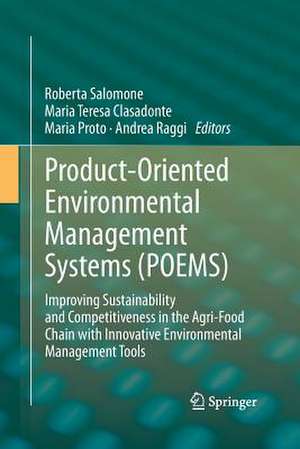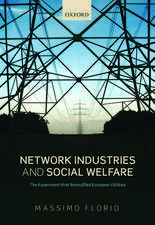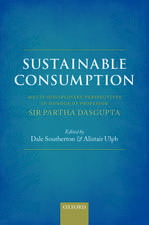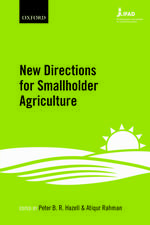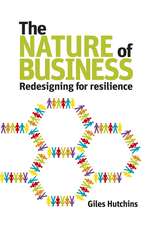Product-Oriented Environmental Management Systems (POEMS): Improving Sustainability and Competitiveness in the Agri-Food Chain with Innovative Environmental Management Tools
Editat de Roberta Salomone, Maria Teresa Clasadonte, Maria Proto, Andrea Raggien Limba Engleză Paperback – 24 iun 2015
| Toate formatele și edițiile | Preț | Express |
|---|---|---|
| Paperback (1) | 947.18 lei 6-8 săpt. | |
| SPRINGER NETHERLANDS – 24 iun 2015 | 947.18 lei 6-8 săpt. | |
| Hardback (1) | 953.20 lei 6-8 săpt. | |
| SPRINGER NETHERLANDS – 4 iun 2013 | 953.20 lei 6-8 săpt. |
Preț: 947.18 lei
Preț vechi: 1155.11 lei
-18% Nou
Puncte Express: 1421
Preț estimativ în valută:
181.26€ • 196.83$ • 152.26£
181.26€ • 196.83$ • 152.26£
Carte tipărită la comandă
Livrare economică 23 aprilie-07 mai
Preluare comenzi: 021 569.72.76
Specificații
ISBN-13: 9789401780711
ISBN-10: 9401780714
Pagini: 352
Ilustrații: XVII, 332 p.
Dimensiuni: 155 x 235 x 18 mm
Greutate: 0.49 kg
Ediția:2013
Editura: SPRINGER NETHERLANDS
Colecția Springer
Locul publicării:Dordrecht, Netherlands
ISBN-10: 9401780714
Pagini: 352
Ilustrații: XVII, 332 p.
Dimensiuni: 155 x 235 x 18 mm
Greutate: 0.49 kg
Ediția:2013
Editura: SPRINGER NETHERLANDS
Colecția Springer
Locul publicării:Dordrecht, Netherlands
Public țintă
ResearchCuprins
PART I: Background and Concept.- 1. Innovative Environmental Management Tools For the Agri-Food Chain.- PART II: Integrated Management Systems (IMS).- 2. The Integration of Quality Management and Environmental Management Systems.- 3. A Model of Integrated Management System for Agri-Food Small and Medium Enterprises (SMEs).- 4. The Implementation of Integrated Management System in Agri-Food SMEs.- PART III - Simplified Life Cycle Assessment (s-LCA).- 5. Life Cycle Assessment (LCA) For the Agri-Food Sector.- 6. A Model of Simplified LCA For Agri-Food SMEs.- 7. The Implementation of s-LCA in Agri-Food SMEs.- PART IV: Environmental Labels and Declarations.- 8. Environmental Labels and Declarations in the Agri-Food Sector.- 9. Guidelines for Environmental Labels in the Agri-Food SMEs.- 10. The Implementation of the Guidelines for Environmental Labels and Declarations in Agri-Food SMEs.- PART V: Product-Oriented Environmental Management Systems (POEMS).- 11. Product-Oriented Environmental Management Systems: Methodologies and Experiences.- 12. A Model of Product-Oriented Environmental Management System (POEMS) for Agri-Food SMEs.- 13. The Implementation of Product-Oriented Environmental Management Systems in Agri-Food SMEs.
Textul de pe ultima copertă
Representing the coordinated work of a research group from four different Italian University departments which conducted the Eco-Management for Food (EMAF) Project, this book offers a systematic approach for managing and improving the environmental aspects of agri-food processes and
products using Product-Oriented Environmental Management Systems (POEMS).
The European Commission's EIPRO study estimates that food alone is responsible for 17% of overall emissions of greenhouse gases, and uses 28% of natural resources. Moreover, food wastage in Europe is estimated at 90 million tonnes per year, which translates to 180 kg per person annually. The 2011 European Road Map for Resource Efficiency sets ambitious targets for agriculture by 2020: 50% reduction of waste and wastage; conservation of natural capital, biodiversity and ecosystem services; reduction of land use and improvement of soil quality; independence from fossil fuels.
The distinctive characteristic of the proposed POEMS model is its modular structure: it is composed of a collection of management tools that can be applied, individually (Integrated Management System, Life Cycle Assessment, product environmental labeling guidelines) or as combination of two or more elements, based on the specific requirements and objectives an organization aims to reach.
The contents include the analysis of the individual environmental management tools of which the POEMS model is made up, with a description of their methodological structure and the main results of their implementation in different pilot agri-food companies, in order to verify their effective functioning and to highlight the strong and weak points of the POEMS model and of its individual fundamental components.
The book is designed to help support sound sustainability decision-making, informed by scientifically-sound quantitative information.
products using Product-Oriented Environmental Management Systems (POEMS).
The European Commission's EIPRO study estimates that food alone is responsible for 17% of overall emissions of greenhouse gases, and uses 28% of natural resources. Moreover, food wastage in Europe is estimated at 90 million tonnes per year, which translates to 180 kg per person annually. The 2011 European Road Map for Resource Efficiency sets ambitious targets for agriculture by 2020: 50% reduction of waste and wastage; conservation of natural capital, biodiversity and ecosystem services; reduction of land use and improvement of soil quality; independence from fossil fuels.
The distinctive characteristic of the proposed POEMS model is its modular structure: it is composed of a collection of management tools that can be applied, individually (Integrated Management System, Life Cycle Assessment, product environmental labeling guidelines) or as combination of two or more elements, based on the specific requirements and objectives an organization aims to reach.
The contents include the analysis of the individual environmental management tools of which the POEMS model is made up, with a description of their methodological structure and the main results of their implementation in different pilot agri-food companies, in order to verify their effective functioning and to highlight the strong and weak points of the POEMS model and of its individual fundamental components.
The book is designed to help support sound sustainability decision-making, informed by scientifically-sound quantitative information.
Caracteristici
Describes POEMS, an innovative chain-focused tool for improving environmental performance of products and organizations Shows how this collection of management tools can be applied individually or in combinations, depending on the objectives of the organization Addresses high governmental sustainability goals, and growing consumer interest in sustainable agri-food productions
